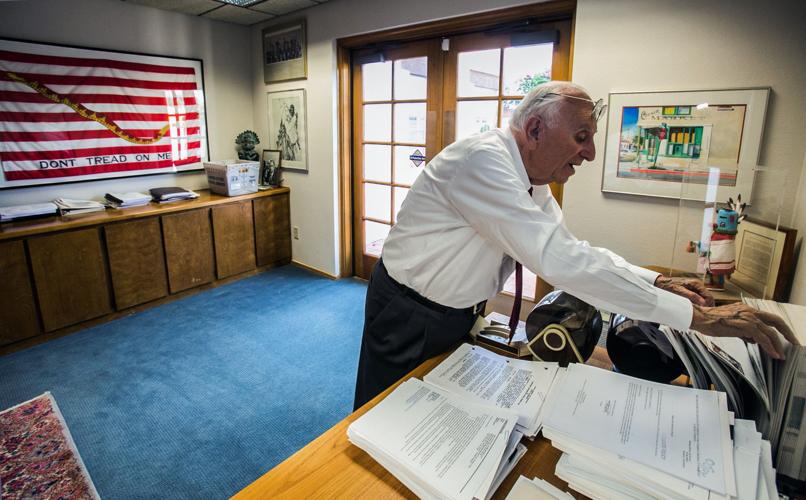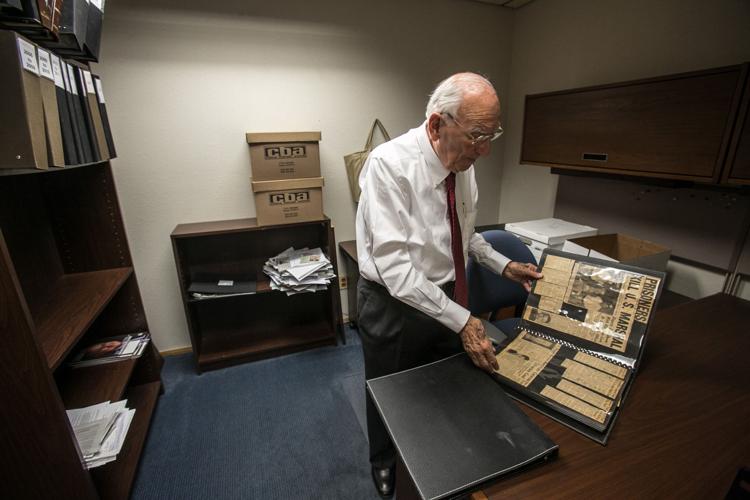Nearing the age of 90, Lowell E. Rothschild recently celebrated practicing law for 65 years and said he has no plans to retire.
“I love it,” says Rothschild, a senior shareholder and a founding partner of the law firm Mesch Clark Rothschild whose career includes being one of Tucson’s premier bankruptcy attorneys. What excites him about practicing law is “solving people’s problems,” said Rothschild, whose practice concentrates on business reorganization and estate planning.
“Part of being a success is showing people there is a middle ground, and people have to learn to settle and solve things,” said Rothschild, who has represented both debtors and creditors in reorganizations.
“It’s complicated, rendering the proper professional services to people. They have problems and it affects their lives. They owe money and they can’t pay it,” said Rothschild.
He now mostly manages about 15 trusts and leaves the courtroom litigation to younger lawyers, who include a former chemist and a mechanical engineer who found their calling in law. Rothschild passes on his knowledge and wisdom to others when they seek his advice.
One of those seekers is Douglas H. Clark Jr. “I learned law in school, but I learned about practicing law from him,” said Clark, looking at Rothschild. “He is a father, a mentor, a boss — everything.” Clark, a shareholder and senior trial attorney with expertise in civil and commercial litigation, said Rothschild taught him “common sense, respect, dignity, honesty and being ethical” in practicing the law.
The firm was founded in 1957, and different partners have come and gone, including the late Alfredo Marquez, who was with the firm for more than two decades. Marquez left when he was confirmed as a federal judge in 1980.
Today, the firm at 259 N. Meyer Ave. is housed in two historic buildings — one with saguaro-ribbed ceilings. The practice employs 39, including 18 lawyers. In addition to bankruptcy law, the firm handles agricultural and construction contracts, arbitration and mediation, employment issues, personal injury, and health-care compliance and regulation.
Three high-profile cases Rothschild reminisced about recently were a company that dealt with a radioactive substance that polluted Tucson’s air and water, keeping the one-square-mile city of South Tucson functioning after it faced a multi-million court judgment, and working to ensure that a health center that served poor minority patients stayed open.
American Atomics Corp. used tritium, a radioactive substance, to manufacture back-lighting for watches and signs. In 1979, it was discovered that the plant was emitting radioactivity into a central neighborhood and was ordered by the state to decontaminate .
The business did not meet its deadline, so then-Gov. Bruce Babbitt seized the tritium, valued at $400,000, said Rothschild, who represented the business in bankruptcy court and had equipment auctioned and developed a payment plan for creditors.
South Tucson officials turned to Rothschild to assist in settling negotiations to repay a $3.6 million judgment — which climbed to more than $4.5 million with interest — to Roy Garcia, a Tucson Police Department officer.
Garcia was shot in 1978 by a South Tucson police officer during a multi-agency operation involving a shotgun-wielding man barricaded inside a house in South Tucson. The bullet shattered Garcia’s spine, paralyzing him below the waist.
Rothschild filed a petition for reorganization in federal bankruptcy court to protect residents from a special tax levy. The city continued operating while debts were consolidated and a payment plan was constructed. A settlement was reached in 1984 involving a bond sale and transfer of land.
Rothschild and his partner, Michael McGrath, worked to keep the then-El Rio Santa Cruz Neighborhood Health Center open so it could continue caring for primarily poor minority patients. In 1986, they filed for Chapter 11 bankruptcy reorganization for the center. El Rio owed $6.5 million in debt and had $3.5 million in assets. One of its major creditors, University Medical Center, agreed to not pursue a $1.5 million lawsuit against El Rio, which remained open during the reorganization.
Rothschild proudly mentions that his two grandsons, Nathan and Isaac Rothschild, work for the firm, and their sister, Molly, plans to enroll in law school. His son, Jonathan Rothschild, left the practice to be Tucson’s mayor. Lowell’s daughter, Jennifer, is a paralegal in Denver who works to help inventors get patents.
Rothschild, who was married to his late wife, Anne, for 62 years, said he enjoys practicing law and has no plans to stop .
The native of Chicago, who moved to Tucson with his mother in 1942 and received his law degree from the University of Arizona through the GI Bill after serving in the Navy, said the community has been very good to his firm “and we understand our responsibility to give back.” Lawyers in the practice have received numerous recognitions for taking on cases pro bono — something that is a must for Rothschild.
In addition to pro bono work, Rothschild has lectured on bankruptcy and business reorganization, law practice skills and law practice management to students at the UA’s James E. Rogers College of Law. He has presented for the Pima County Bar Association and the American Bar Associations of Arizona, California and Washington.
Toni M. Massaro, UA College of Law professor and dean emerita, described Rothschild as a “nationally respected lawyer” who “has given generously of his time and wisdom.” She said he has helped students by placing them with mentors. “Lowell models professional integrity and genuine love and respect for the practice of law,” Massaro said.
Rothschild has served on numerous boards including the UA Foundation, as president of the Tucson Airport Authority, the Pima County Legal Aid Society and as president of Temple Emanu-El.
“My life is full,” said Rothschild.







